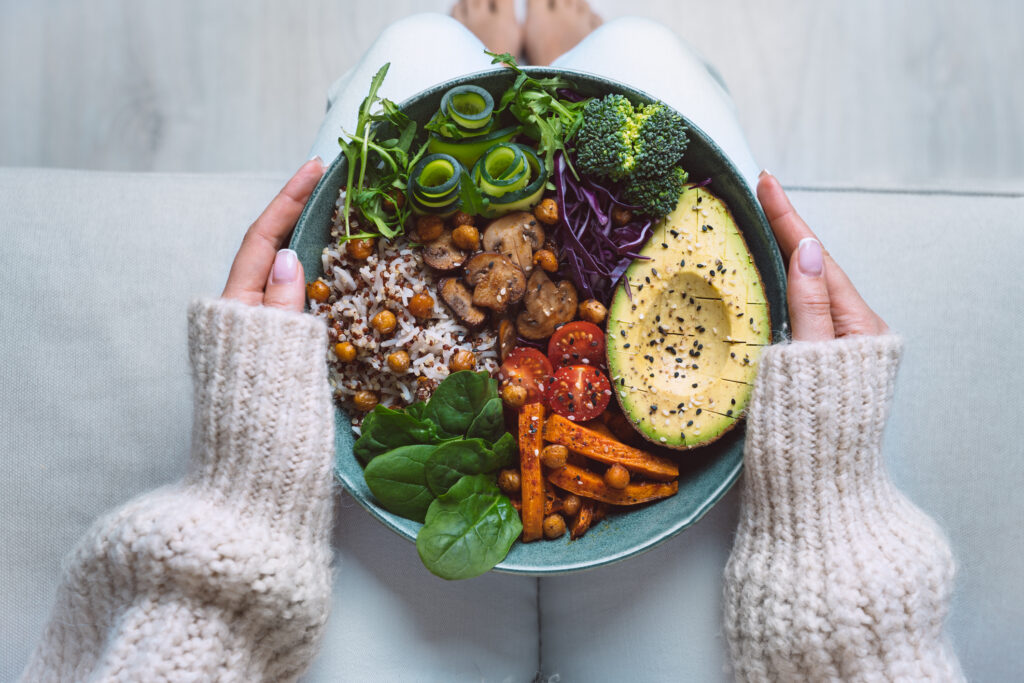
Article

A groundbreaking new study has found that following a plant-based diet could help reduce insulin needs for patients with type 1 diabetes.
It’s already well-established that eating a healthy, whole foods plant-based diet can be an effective way to prevent and treat Type 2 diabetes – and now, a new study has found that it could help manage Type 1 diabetes, too.
With the cost of insulin remaining a concern for many, our groundbreaking research shows that a low-fat vegan diet that doesn’t restrict carbs may be the prescription for reducing insulin needs, managing blood sugar levels, and improving heart health in Type 1 diabetes.
Hana Kahleova, M.D., Ph.D., lead author

Type 1 diabetes is an autoimmune condition in which the pancreas produces little or no insulin, the hormone responsible for moving glucose from the bloodstream into the body’s cells so it can be used as energy. As a result, glucose stays in the bloodstream for longer than it should, which can cause high blood sugar, damage the blood vessels, and lead to a whole host of serious health problems.
Although there isn’t yet a cure for Type 1 diabetes, certain lifestyle changes – like adopting a diet rich in whole plant foods – can improve insulin sensitivity, reduce insulin needs, and promote better cardiac health in people with the disease.
This latest study, led by experts at the Physicians Committee for Responsible Medicine and published in Clinical Diabetes, represents the first randomised clinical trial to specifically assess the impact that following a vegan diet has on Type 1 diabetes.
Participants were split into two groups: One group followed a low-fat vegan diet, and were allowed to eat as much as they liked, whereas the other group followed a non-vegan diet (according to individualised diet plans which reduced their daily calorie intake by between 500 and 1000 calories).
For 12 weeks, patients recorded their nutrient intake and insulin doses at each meal – and the results were compelling:
By the end of the trial, participants in the vegan group had lost an average of 5kg, reduced their insulin needs by 28%, and improved their insulin sensitivity by 127%, while no significant changes were observed in the non-vegan group.

Eliminating animal products and moving to a diet rich in whole and minimally processed plant foods can significantly reduce the problems created by Type 1 diabetes.
Forks Over Knives
Average blood sugar levels improved for both groups, with a slightly larger improvement noted in the vegan group.
One of the reasons for these results – among many other benefits, like being naturally lower in saturated fat – is that a healthy plant-based diet is abundant in dietary fibre, which assists with weight management and blood glucose control.
Diabetes and heart disease are closely linked, so researchers also ran participants’ lipid panels. There was a reduction in total cholesterol in both groups, but the vegan group saw a more beneficial drop-off of about 32 points, compared to only an 11 point drop-off for the non-vegan group.
This result indicates that the vegan diet was more effective at reducing total cholesterol levels, making it the better choice for reducing the risk of heart disease in patients with diabetes.
The prevalence of diabetes has tripled over the last 25 years, and there is no sign of it slowing.
Although there is no known way to prevent Type 1 diabetes, it’s important to note that Type 2 diabetes (which accounts for the vast majority of cases) is largely preventable with lifestyle interventions.

The blame for the current diabetes epidemic lies in an overall dietary pattern emphasising meat, dairy products, fatty foods, and sugary foods and beverages.
Doctors for Nutrition
In fact, research has shown that following a healthy eating plan, maintaining a healthy weight, and staying active have been shown to drastically reduce the incidence of type 2 diabetes.
A diet emphasising vegetables, fruits, whole grains, and legumes, and avoiding animal products helps prevent diabetes and improves its management when it has been diagnosed.
Doctors for Nutrition
For the 1.2 million Australians who are currently living with known diabetes (and many more who are simply undiagnosed), awareness of the science-backed health benefits of adopting a plant-based diet could prove life-changing – empowering them with a natural way to manage and even reverse the condition.
You’re not alone – according to a recent CSIRO report, only 2 in 5 Australians are eating enough veggies, meaning that most of us have room for improvement! Evidently, we’re all in this together 🧡

Changing your diet can seem daunting at first, but it doesn’t have to be. Take it step by step with these small, everyday changes that are super easy to implement, yet have a massive payoff in helping you shift towards eating more plant-rich meals.
Or if you’re keen for even more tips and nutritional info, as well as some tasty recipes, grab a free kit to get you started. ![]()
Important note: Schedule a chat with your GP first if you’re keen to change your eating habits because of a pre-existing health condition. Shifting to a low-fat plant-based diet can rapidly reduce medication needs for diabetic patients – which is amazing, of course – but also means it’s essential to have guidance from a medical professional along the way! You can find a database of plant-friendly clinicians, including doctors and dietitians, here.

Lisa’s love of food is only trounced by her love of animals. So when she announced she’d gone veg, her Hungarian grandmother exclaimed with exasperation, ‘oh Lisa, I knew this day would come’ … before promptly frying up a plate of cauliflower schnitzels. It turns out – from Goulash to Paprikás to the family’s favourite Hungarian sweet treats – plants really can be the centrepiece of any meal!